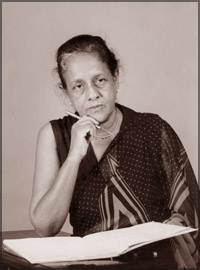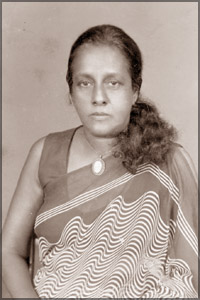Scrutinizing complex human emotions
Tender hand sensitive to social transformations
understanding roots :
 Q: "That Deep Silence ", the collection of short stories and poems
which is still in manuscript form, is a book with moving short stories.
The title story 'That Deep Silence', for instance codifying the erosion
of cardinal values which make Asian family a unique and strong entity.
How do you analyze the present generation admiring material prosperity
and financial gains against sentimental values? Q: "That Deep Silence ", the collection of short stories and poems
which is still in manuscript form, is a book with moving short stories.
The title story 'That Deep Silence', for instance codifying the erosion
of cardinal values which make Asian family a unique and strong entity.
How do you analyze the present generation admiring material prosperity
and financial gains against sentimental values?
A: We can not expect them to have the same values we had because
their life style is different. To begin with their living under a lot of
pressure and stress to achieve something in their schooling and they
have to pass examinations and achieve something in this world and
without which they are not secure.
 I do not think time for much sentiments and value of preserve human
relationship because they are in a kind of a rat race to find a place
for themselves. With modern parents, both mother and father, working and
grandmother and relatives not being in the picture, they haven't got
that sense of belonging to a family as such. They are isolated and very
often left with tutors and television for company. I do not think time for much sentiments and value of preserve human
relationship because they are in a kind of a rat race to find a place
for themselves. With modern parents, both mother and father, working and
grandmother and relatives not being in the picture, they haven't got
that sense of belonging to a family as such. They are isolated and very
often left with tutors and television for company.
That is their world today and so you can not expect them to value the
things we did when we were young because the entire world has changed
and becomes a global village. Their values have also changed. They are
also, I find, much more independent and able to fend for themselves. I
find that they are much more capable of being on their own and managing
on their own and being without people unlike we were. We were dependent
very much on others. They don't need that kind of environment that we
had. They do not get relatives dropping in, aunt and uncle living with
them. This generation communicates through cellular phones. They keep in
touch through their phones and cellular phones glued to their ears.
Q: Traditional place in a house for grandparents has gradually
been diminished and instead 'homes for the Elders' and paying homes for
the elders have come up along with high rising apartments. How do you
view this erosion of long held societal values and the collapse of
leisurely life style of the bygone era and emerging of hectic commercial
lifestyle which its entire purpose is earning money?
A: Because I know a lot of elderly people who are today all by
themselves or they have been put in to homes because the younger
generation just
cannot cope with looking after all the people and also managing their
own lives.
They are working and most of them are intent on making money and
establishing themselves and therefore they have no time for the older
people.
Q: This process of distancing of relationship among
individuals has further been grotesquely described in a short story "No
Grass for my feet "in the unpublished manuscript. How do you perceive
the collapse of the old life and de-humanizing isolation that
individuals feel in modern society?
A: I am still lucky in the sense that my children are around
me though the couple of grandchildren have gone abroad. But I know a lot
of other old people who are completely isolated and most of their
children have gone abroad. They are completely without family around
them.
If I take the story alone, that was when, as I described, the grass
was there because the land was available at that time and houses had
wide gardens. We were living with our grandparents and we were part of a
family; grandparents, our parents and relations. But today, we do not
get that atmosphere. In that story, the character ends up in a
condominium which today is the popular way of isolation up in the air.
And of course families live in condominiums. This particular person is
living alone because the family is not there. Still condominium as
contrasts with old homes with gardens, is quite a different today
because there is no grass for children to play. I find a lot of children
in Colombo running to the Viharamahadevi Park in the evenings and they
are running there with bare feet. So living today in Colombo has
changed.
Q: As most of the great writers, you had been a voracious
reader before becoming a prolific writer in English. You are the most
matured writer in English in Sri Lanka and most of your novels including
"Giraya" was made into a tele-drama. How did you commence your
trailblazing literary career?
A: I have been a voracious reader and my mother encouraged me
and she bought me books at various stages of my life beginning with
stories leading on with Enid Blyton. She was a craze for young people
and her story the magic far away Tree would have made many a child live
a world of imagination. And from there I read Bronte sisters and then
Pearl S. Buck and Somerset Maugham and from stage to stage I went on
reading. In fact, one complaint was that my grandmother didn't not like
my reading and she said "this girl is always with her head buried in a
book".
I commenced my career with the reading and I was not very comfortable
with speech when I was young. Even at school I found myself in
difficulty freely talking with people but I could express myself better
in writing. And I suppose that's a kind of invitation where I eventually
end up.
|
The foremost hand in English fiction in Sri Lanka, Punyakante
Wijenaike offers a multifaceted personality embodying noble qualities of
kindheartedness, pleasant disposition and above all a gracious lady to
the finger tips. With her extraordinary power of imagination she has
grown a bed of flowers in an otherwise, desolate meadow of Sri Lankan
writings in English.
Thus born literary roses like "The Waiting Earth", " Giraya"," A way
of life", "Yukthi and other stories", "Amulet", "To follow the Sun". The
fragrance of her writing pervades the literary landscape inspiring new
generation of writers to come.
Her corpus of writing explores wide range of issues and complex human
emotions in a lucid and down to earth diction which, over the years, has
become her signature. My first literary encounter with her is "The
Waiting Earth" with its memorable picture on the cover, taken from the
bravura "Sagara Jalaya Madi Handuva Oba Handa" by Sumitra Peiries, that
explores issue of landless peasantry who are longing to own a plot of
land to be passed on to their children as inheritance. In "Giraya" and
"Amulet", Punyakante, for the first time, brought themes of
homosexuality and incest which above all indicate that the writer is
sensitive to the upheavals in society. She has amply demonstrated
through her creative writings that she understood the roots of the
nation and codified them in a deeply-rooted manner. |
Q: "The Third Woman" was a collection of short stories that
you penned in 1963 by and large reflecting the life in Sri Lankan
villages. Even at the time, mentioning of a 'third marriage' or man
having three women in a conservative society would have been a radical
departure from the widely held norms of the society. How do you consider
'The Third Woman 'in your literary career and does it mark a milestone
in your career?
A: 'The Third Woman' was at the beginning of my writing
career. Its good reception gave me courage to keep on writing and it was
the beginning. I think that beginning of my trying to keep to what I
want to say, now reality and truth.
I believe in writing the truth. That was the beginning of my style of
writing.
Q: As your first novel " The Waiting Earth " is an important
work which deals with a story of a landless farmer trying to possess a
land in order to pass it on to his children as an inheritance. From
where did you gather material for your novel or were you inspired by any
incident or person to write the novel?
A: Story was inspired by the people of that period. I came to
know that such people did exist because my father and grandfather had
land and people were working on them. I also came to know women who were
the silent and patient carrying heavy burdens without complaints. Women,
who worked there on the land and perhaps, even in our home. Today, we
rarely do find such people and may be in a way that is a kind of
advancement in Sri Lanka.
Q: Perhaps, "Giraya" which was made into a tele-drama made you
a household name not only among English readers but also among Sri
Lankans throughout the country. What inspired you to pen the novel? And
you have, for the first time, mentioned about homosexual relationship in
the novel 'Giraya' and did you think about this aspect when you wrote
the novel or did it find its way into the plot quite unintentionally?
A: I found it while wandering through the Colombo museum. That
extra ordinary "Giraya", was with a head of a woman and hands clasped in
a prayer and it gave me an idea and I was like possessed by that. I came
home and I wanted to write a story on it.
As for the homosexual part in it, I did not invent it was in my own
backdrop. "Giraya" is the only novel that did not need research. I think
most of the material came from my own background. That is the Walauwa, a
kind of house I lived. It was in Colombo. "Giraya" was also there but
not in this shape. It was an ordinary one. It was used very often for
arecanut slicing for my grandmother and my mother as well as use for
cutting lime for "Asvaha" and other rituals. So that it is something I
knew from my own background and mystic elements came naturally because
my grandmother was superstitious and they did a lot of those ceremonies.
The homosexual part came from some one I knew was that way inclined.
The story was imagination.
Q: 'Giraya' also reflects socio-cultural milieu and also
relationship between member of the manor house and villagers. Especially
Lucia Hamy is a character which etches in the minds of the readers
although she is a mere servant in the house. How did you make these
characters? Did you do research into village life before embarking on
writing the novel?
A: In Village life, there was one similar to Lucia Hammy in my
background. I only exaggerated.

Q: Although the inmates of the manor house in "Giraya" speak
in English, they are deeply entrenched in superstitions. The element of
superstition plays a vital role in the plot. Did you include mystic
element into the plot?
A: Again from my background of my own where people in the
house were talking both English and Sinhala, but also believe in these
superstitions. I was also familiar with them from my childhood.
Q: 'The Rebel 'a collection of short stories written in 1979
and was based on the JVP insurrection. In retrospect, how did the 1971
insurrection influence you as a writer?
A: I felt its impact only when we underwent same kind of
terror now in Colombo over bombs. There were no bombs then but there
were shortages of food and shortages of drugs in hospitals because my
own daughter had to enter hospital and we had to bring drugs down from
abroad. JVP insurgents would patrol outside the hospital prevent workers
from coming to work. There was a threat of water being cut in Colombo.
I was not aware this insurgency was to take place but the strange
thing I remembered was Mrs. Sybil Wettasinghe and I went to interview
just a day before it started. Girl students answered questions quite
normally. Then we learnt they were also into this.
Q: "A way of life "which you wrote in 1987, is an important
work in terms of its literary value and In terms of recollecting your
life. As a matured writer who has witnessed the changes that country has
been going through since the independence, how do you perceive your
life? What is the philosophy which guides the course of your life?
A: I know the changes because my family was involved in
politics before independence. I remembered we were under Colonial rule.
I went to school managed by sisters from abroad. I felt having this
resentment deep inside me that everything we had to eat, was imported
just from abroad; tinned foods, toys. I felt a kind of a rebellion in
the way we were living. But life has changed. Today I think we have a
better balance between our own way of living and the West.
I have gone through a lot of changes, good and bad. We have lived
with our back to the wall but I have never had the desire to leave the
country unless I was compelled to.
Q: "Yukthi" (Justice) which came in 1991, is also a collection
of short stories where you have been influenced by political upheaval
culminating in the signing of the now defunct Indo-Sri Lanka Agreement.
The main story is woven around navy officer who attacked the visiting
Indian Prime Minister Rajeev Gandhi. How do you view the entire episode
and subsequent events which changed the course of the country?
A: I viewed the episode of the naval rating's unfortunate act
with great interest. I followed all the newspaper articles. I felt moved
by his feelings as if I too felt myself his feeling of injustice. He was
a man who had fought against our enemy and almost sacrificed his life.
Suddenly there are some changes being introduced into the country.
Unlike most people in Colombo I felt I had a feeling of sympathy with
this naval rating who I felt had a reason to act in this manner. That he
must have felt injustice that after having fought for the country, here
the foreign intervention was being brought and it was insult for him to
be a guard of honour for the Prime Minister who had come to divide this
country.I wrote the story in the form of a court room where he is being
judged. He was kind of standing up for the country. That was the chief
story in the book.
But later on, I came across newspaper cutting of his own story and I
was amazed to find it was very close to what I have imagined.
Q: "Amulet" is considered as one of best novels you penned.
Besides winging the coveted Gratian Award, "Amulet" stands out on many
aspects of life such as social adaptability, murder and incest. Is it
born out of personal experience or a creation of your fertile
imagination?
A: This to begin with, this was like a sequel to "Giraya" because I
was asked to write a sequel to "Giraya". I found I could not do it
because the chief character was dead. So I created "Amulet". Based on a
mystic quality. It is a the story of a girl, who had been brought up
like a potted plant in her own home and sent to her husband's home, she
married later and took root.
But she was so protected like a potted plant so she did not know
reality.
When she came to husband's house she was bewildered with what she had
to come to terms with. It was there she found, to her horror, the
husband's diary and read out what her husband had really been. He had
had a incestual relationship with his own sister which was, to a large
extent, promoted by their domestic aid to bathe together in one bath
tub. Incest is followed by murder.
Q: What are your views on contemporary Sri Lankan writings in
English and literary circles like the Wadiya Group of Writers, English
Writers' cooperative, Galle Literary Festival?
A: I am happy today people are taking writing in English very
seriously and which it was not there when I began writing.
There are many writers as today and many literary festivals. Today a
lot of encouragement was given to writing which I am very glad. There
are good writings and bad writings but generally we are progressing. |
